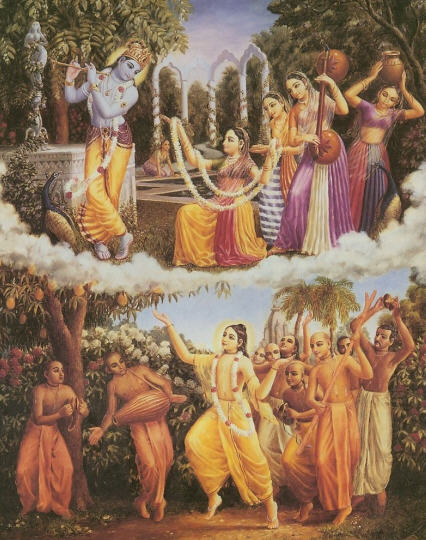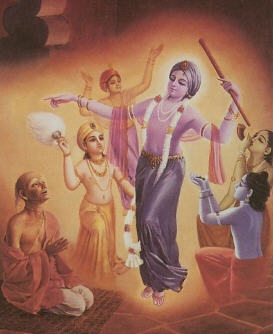A 16th-Century Bengali Masterpiece

BY ANY STANDARDS, Caitanya Mahaprabhu led a most remarkable life. As a child-scholar, He refuted the leading philosophers of His day. Later, as a young renunciant, He traveled widely, converting kings,panditas, Muslims, Buddhists, and thousands of their followers to the path of Krsna-bhakti. In His final years, He exhibited unprecedented miracles and devotional ecstasies. Even today, five hundred years later, Lord Caitanya's movement reverberates around the world with startling religious vitality.
Yet Caitanya Mahaprabhu is much more than a famous medieval Indian religious leader. He is Lord Sri Krsna, the Supreme Personality of Godhead Himself, appearing as a devotee. Lord Caitanya fulfilled the ancient Puranic prophecy that Lord Krsna would incarnate in the present age of godlessness, known as Kali-yuga, to distribute love of Godhead throughout the world.
In the late 1500s, the aged and learned Krsnadasa Kaviraja Gosvami chronicled Lord Caitanya's pastimes in Sri Caitanya-caritamrta. Working in a simple mud dwelling on the bank of the sacred lake known as Radha Kunda, Krsnadasa Kaviraja drew extensively from the diaries of Lord Caitanya's secretaries. From their descriptions, and first-hand accounts of other eyewitnesses, he compiled a detailed biography. He emphasized the Lord's later pastimes, as well as His divinity and His profound philosophical teachings.
Over time, prominent Bengali-literate Western scholars of religion came to value Sri Caitanya-caritamrta highly for both its biographical and philosophical excellence. In the early 1970s, one of America's leading specialists in Indian religions began an eagerly awaited first English translation. He intended to make the work available for scholars and postgraduate students of Indian religions.
During the same period, His Divine Grace A.C. Bhaktivedanta Swami Prabhupada began his own translation of Sri Caitanya-caritamrta. Srila Prabhupada's purpose, however, was quite different. He had founded the International Society for Krishna Consciousness in 1966, and now many of its thousands of members, his disciples, had begun to mature in Krsna-bhakti. So Srila Prabhupada, having completed the Bhagavad-gita As It Is (the fundamental text of spiritual life) and many volumes of the vast Srimad-Bhagavatam (a graduate-level scripture), at his disciples' request began work on Sri Caitanya-caritamrta, a text he called the "postgraduate study of spiritual life." Among his many other gifts, Srila Prabhupada wanted to leave his followers an authorized translation of this ultimate devotional classic.
Like Krsnadasa Kaviraja Gosvami, Srila Prabhupada began his project at an advanced age. Unlike his great predecessor, Srila Prabhupada was the leader of a worldwide spiritual society that needed his constant travel and challenged him with diverse problems. Rising early and working before dawn each day in the course of his international travels, Srila Prabhupada nonetheless managed to complete Sri Caitanya-caritamrta in just eighteen months. He painstakingly translated each Bengali and Sanskrit verse to English, word for word, followed by a full translation and purport. The result of his extraordinary literary efforts would ultimately be published in seventeen full-sized volumes.

But to Srila Prabhupada's dismay, publication lagged behind. The two leading managers of the BBT, Prabhupada's Bhaktivedanta Book Trust, were still working on the Bhagavatam. Yet they presented Prabhupada an ambitious plan for increasing the BBT's pace of production fourfold one book a month. Srila Prabhupada shocked them by his response: "It is not fast enough. You have to do all the books in two months' time."
The managers stared in disbelief. Seventeen books in two months?
"Srila Prabhupada," one ventured, "I think that's impossible. Maybe we can go faster …"
Srila Prabhupada responded without anger, but very gravely: "Impossible is a word found in a fool's dictionary."
Consulting among themselves, the BBT leaders and staff resolved to meet Srila Prabhupada's challenge. Srila Prabhupada himself agreed to provide special help. Thus began an unparalleled two-month publication marathon in which Srila Prabhupada's personal example fueled the BBT workers with inspiration.
The managers quickly assembled a team of fifty devotee workers. Photographers flew off to India. Bengali editors double-checked each text with Srila Prabhupada, while the English editors, typesetters, proofreaders, and layout artists worked seven days a week from dawn to midnight and beyond. The BBT artists whose original paintings would illustrate each volume sacrificed their personal styles to accommodate a faster, more efficient method of finishing one another's work together. Even the BBT's printer, Kingsport Press in Tennessee, pushed back other work in order to accommodate the intense printing schedule. The marathon was on!
The BBT workers adopted the devotional mood of atma-nivedanam, surrendering everything to Krsna. Typesetters worked in shifts twenty-four hours a day. The typesetting computer man barely slept. Determined to fulfill Srila Prabhupada's order, the devotees pushed themselves to new heights of accomplishment.
Soon new volumes of Sri Caitanya-caritamrta began to be offered on the altar in Los Angeles, BBT's home temple. To the trained eye, the shiny gold volumes fell slightly short of BBT's high editorial and artistic standards. Nonetheless, Srila Prabhupada handled each new volume with satisfaction.
Two months from the day of Srila Prabhupada's order, the last of the seventeen volumes of Sri Caitanya-caritamrta arrived from Kingsport Press. The jubilant BBT press workers basked in the glow of Srila Prabhupada's blessings. By the grace of guru and Krsna, an "impossible" miracle had been done.
In addition to larger runs of certain volumes, the BBT printed twenty thousand complete seventeen-volume sets. Many sets were instantly snapped up by eager scholars and academic libraries. Readers bought thousands more for their home libraries. Devotees sold individual volumes in public places. In addition, BBTs in India, South America, and Europe began translating Sri Caitanya-caritamrta into dozens of languages.
Grateful scholars heaped praise upon the publication. Dr. J. Bruce Long of Cornell University called it "a cause for celebration." Teachers could now introduce their students to direct source material about Lord Caitanya's life and teachings, and they loved it.
Many years later, when the noted American Indologist finally published what was now the second English translation of Sri Caitanya-caritamrta, Srila Prabhupada's work had already circled the globe. But Srila Prabhupada's translation did much more than simply fill a significant vacuum in the academic study of Hinduism. As a pure devotee of Lord Caitanya, Srila Prabhupada conveyed the true spirit of Lord Caitanya's life and teachings. As a result, Lord Caitanya has now touched millions of hearts and become part of millions of lives in every corner of the world. In this way, Srila Prabhupada has fulfilled one of Lord Caitanya's own prophecies: "In every town and village of the earth, My holy name will be sung."
Kalakantha Dasa, a devotee since 1972, is a member of the ISKCON Foundation staff. He lives with his wife and their two young daughters in Alachua, Florida.
